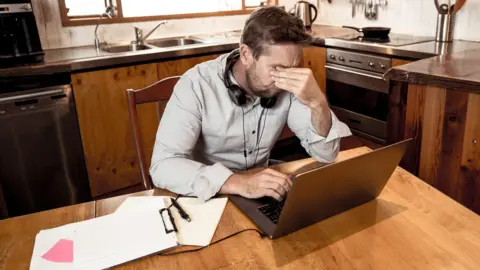Pricey broadband 'locks poorest out' of key services
 Getty Images
Getty ImagesOne in six households is struggling to afford broadband during the current UK lockdowns, according to a survey by Citizens Advice.
The charity warned that the poorest people were effectively being “locked out” of access to key services.
Only three of the 13 largest broadband providers offer affordable tariffs for those on low-income benefits, it said.
It is calling on the government to force providers to offer cheaper plans to people struggling financially.
Citizens Advice also wants the telecoms regulator Ofcom to take action.
"Broadband allows people to be part of society," said Ned Dukes, community advice worker at Citizens Advice Haringey.
Applying for support, as well as job applications and job interviews, are largely all carried out online.
"Without access to the internet, people are effectively locked out of key services and everything they need to live a full and proper life," he added.
"But for people on welfare benefits, every single decision about how they spend £1 can make a difference. Broadband can be incredibly expensive."
In December, Ofcom said that households were paying an average of £37 a month for a landline and broadband - with more than 4.7 million struggling to afford their bills.
Out of 1,646 surveyed by Citizens Advice who said they have broadband, 275 said they struggled to pay their broadband bills between March last year - when the first lockdown began - and January 2021.
Citizens Advice estimated that 2.3 million people had fallen behind on their broadband bill towards the end of last year.
A government spokesperson told the BBC: "We brokered a deal with the major telecoms providers who have committed to support those finding it difficult to pay their bills.
This includes ensuring customers are fairly treated and to offer generous mobile and landline packages to vulnerable customers. However we do encourage providers to go further on fixed broadband and offer a social tariff to those on low incomes during these challenging times."
‘Heartbreaking’
Maxine, who lives alone, claimed universal credit in March when she lost work in the hospitality industry.
“Throughout the lockdown the only way I've been able to see my elderly parents, and most of my grandkids is on video calls,” she said.
 Citizens Advice
Citizens Advice“I don't have broadband as I can't afford it, so when my data has gone I can't see them any more.
“Do you know how heartbreaking it is to not be able to see them? It's really isolating just being alone.
“There were times where if I ran out of data it would be weeks until I saw another person.”
Not being able to access the internet for food shopping, job applications, checking benefits and bills, means you “lose out”, she added.
Alistair Cromwell, acting chief executive of Citizens Advice, said: "The pandemic has cemented the fact that broadband is an essential utility. It is not a luxury for those who can afford it.
"Without broadband we struggle to teach our children, order food and medicines, work or search for a job.
"While the government has provided free laptops and mobile data to help children study at home, these are ultimately just a sticking plaster.
"To tackle the digital divide, it must take urgent action to ensure everyone can afford their broadband, no matter which provider they are with."
Ofcom said it agrees that afforable broadband is "vital".
"Some companies already offer low cost tariffs for certain customers, but we're pushing all providers to do more to support those in financial difficulty," a spokesman said.
"Although we can't make social tariffs mandatory without a formal direction from government, we're continuing to collect data on affordability and we're ready to act if more measures are needed."
The government has been contacted for comment.
